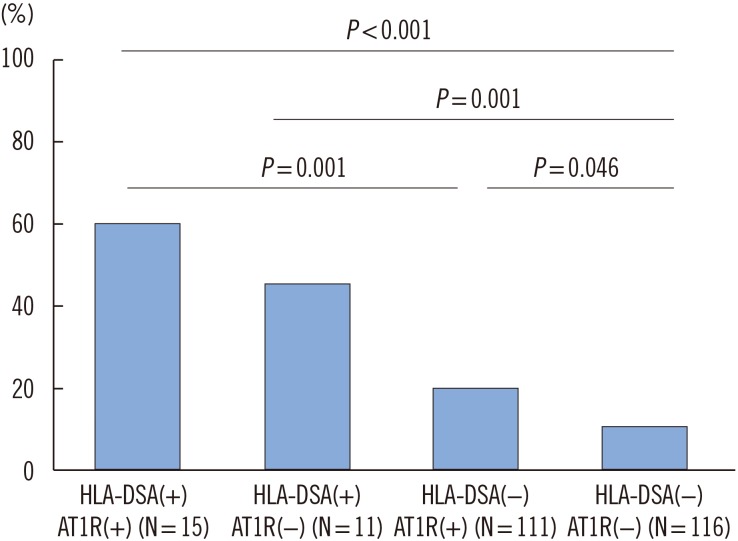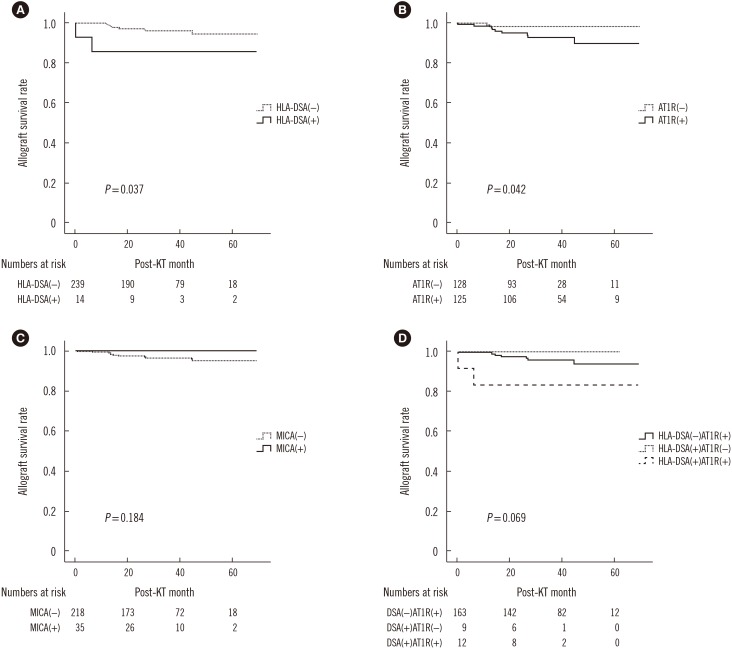Clinical Impact of Pre-transplant Antibodies Against Angiotensin II Type I Receptor and Major Histocompatibility Complex Class I-Related Chain A in Kidney Transplant Patients
- Affiliations
-
- 1Division of Nephrology, Department of Internal Medicine, Bucheon St. Mary's Hospital, College of Medicine, The Catholic University of Korea, Bucheon, Korea.
- 2Department of Laboratory Medicine, Seoul St. Mary's Hospital, College of Medicine, The Catholic University of Korea, Seoul, Korea. ejoh@catholic.ac.kr
- 3Department of Laboratory Medicine, Catholic Kwandong University International St. Mary's Hospital, Incheon, Korea.
- 4Division of Nephrology, Department of Internal Medicine, Seoul St. Mary's Hospital, College of Medicine, The Catholic University of Korea, Seoul, Korea. chungbh@catholic.ac.kr
- 5Department of Hospital Pathology, Seoul St. Mary's Hospital, College of Medicine, The Catholic University of Korea, Seoul, Korea.
- KMID: 2434735
- DOI: http://doi.org/10.3343/alm.2018.38.5.450
Abstract
- BACKGROUND
Evidence of antibody-mediated injury in the absence of donor-specific HLA antibodies (HLA-DSA) has recently emerged, suggesting a role of antibodies in targeting non-HLA antigens expressed on renal allograft tissue. However, the clinical significance of pre-transplant non-HLA antibodies remains unclear. We compared the histological and clinical impact of pre-transplant HLA-DSA and non-HLA antibodies, especially angiotensin II type I receptor (anti-AT1R) and MHC class I-related chain A (anti-MICA), in kidney transplant patients.
METHODS
Pre-transplant HLA-DSA, anti-AT1R, and anti-MICA were retrospectively examined in 359 kidney transplant patients to determine the effect of each antibody on allograft survival and clinical characteristics.
RESULTS
Pre-transplant HLA-DSA, anti-AT1R, and anti-MICA were detected in 37 (10.3%), 174 (48.5%), and 50 patients (13.9%), respectively. Post-transplant antibody-mediated rejection was associated with a pre-transplant HLA-DSA (+) status only. The development of microvascular inflammation (MVI) was associated with pre-transplant HLA-DSA (P=0.001) and anti-AT1R (P=0.036). Anti-AT1R (+) patients had significantly lower allograft survival compared with anti-AT1R (−) patients (P=0.042). Only pre-transplant anti-AT1R positivity was an independent risk factor for allograft failure (hazard ratio 4.824, confidence interval 1.017-24.888; P=0.038). MVI was the most common histological feature of allograft failure in patients with pre-transplant anti-AT1R.
CONCLUSIONS
Pre-transplant anti-AT1R is an important risk factor for allograft failure, which may be mediated by MVI induction in the allograft tissue.
Keyword
MeSH Terms
Figure
Cited by 4 articles
-
Angiotensin II type 1 receptor antibodies in kidney transplantation
Hyeyoung Lee, Eun-Jee Oh
Korean J Transplant. 2019;33(1):6-12. doi: 10.4285/jkstn.2019.33.1.6.Pre-Transplant Angiotensin II Type 1 Receptor Antibodies and Anti-Endothelial Cell Antibodies Predict Graft Function and Allograft Rejection in a Low-Risk Kidney Transplantation Setting
Shinae Yu, Hee Jae Huh, Kyo Won Lee, Jae Berm Park, Sung-Joo Kim, Wooseong Huh, Hye Ryoun Jang, Ghee Young Kwon, Hyung Hwan Moon, Eun-Suk Kang
Ann Lab Med. 2020;40(5):398-408. doi: 10.3343/alm.2020.40.5.398.Causes of Positive Pretransplant Crossmatches in the Absence of Donor-Specific Anti-Human Leukocyte Antigen Antibodies: A Single-Center Experience
Hyunhye Kang, Jaeeun Yoo, Sang-Yoon Lee, Eun-Jee Oh
Ann Lab Med. 2021;41(4):429-435. doi: 10.3343/alm.2021.41.4.429.Angiotensin II type 1 receptor antibodies in kidney transplantation
Hyeyoung Lee, Eun-Jee Oh
J Korean Soc Transplant. 2019;33(1):6-12. doi: 10.4285/jkstn.2019.33.1.6.
Reference
-
1. Terasaki PI, Ozawa M. Predicting kidney graft failure by HLA antibodies: a prospective trial. Am J Transplant. 2004; 4:438–443. PMID: 14961999.2. Loupy A, Lefaucheur C, Vernerey D, Prugger C, Duong van Huyen JP, Mooney N, et al. Complement-binding anti-HLA antibodies and kidney-allograft survival. N Engl J Med. 2013; 369:1215–1226. PMID: 24066742.3. Wiebe C, Gibson IW, Blydt-Hansen TD, Karpinski M, Ho J, Storsley LJ, et al. Evolution and clinical pathologic correlations of de novo donor-specific HLA antibody post kidney transplant. Am J Transplant. 2012; 12:1157–1167. PMID: 22429309.4. Opelz G. Collaborative Transplant Study. Non-HLA transplantation immunity revealed by lymphocytotoxic antibodies. Lancet. 2005; 365:1570–1576. PMID: 15866311.5. Tait BD, Susal C, Gebel HM, Nickerson PW, Zachary AA, Claas FH, et al. Consensus guidelines on the testing and clinical management issues associated with HLA and non-HLA antibodies in transplantation. Transplantation. 2013; 95:19–47. PMID: 23238534.6. Dragun D, Muller DN, Brasen JH, Fritsche L, Nieminen-Kelha M, Dechend R, et al. Angiotensin II type 1-receptor activating antibodies in renal-allograft rejection. N Engl J Med. 2005; 352:558–569. PMID: 15703421.7. Reinsmoen NL, Lai CH, Heidecke H, Haas M, Cao K, Ong G, et al. Anti-angiotensin type 1 receptor antibodies associated with antibody mediated rejection in donor HLA antibody negative patients. Transplantation. 2010; 90:1473–1477. PMID: 21030904.8. Luo L, Lu J, Wei L, Long D, Guo JY, Shan J, et al. The role of HIF-1 in up-regulating MICA expression on human renal proximal tubular epithelial cells during hypoxia/reoxygenation. BMC Cell Biol. 2010; 11:91. PMID: 21092233.9. Giral M, Foucher Y, Dufay A, Van Huyen JP, Renaudin K, Moreau A, et al. Pretransplant sensitization against angiotensin II type 1 receptor is a risk factor for acute rejection and graft loss. Am J Transplant. 2013; 13:2567–2576. PMID: 23919486.10. Sanchez-Zapardiel E, Castro-Panete MJ, Mancebo E, Morales P, Laguna-Goya R, Morales JM, et al. Early renal graft function deterioration in recipients with preformed anti-MICA antibodies: partial contribution of complement-dependent cytotoxicity. Nephrol Dial Transplant. 2016; 31:150–160. PMID: 26323481.11. Taniguchi M, Rebellato LM, Cai J, Hopfield J, Briley KP, Haisch CE, et al. Higher risk of kidney graft failure in the presence of anti-angiotensin II type-1 receptor antibodies. Am J Transplant. 2013; 13:2577–2589. PMID: 23941128.12. Lee J, Park Y, Kim BS, Lee JG, Kim HJ, Kim YS, et al. Clinical implications of angiotensin II type 1 receptor antibodies in antibody-mediated rejection without detectable donor-specific HLA antibodies after renal transplantation. Transplant Proc. 2015; 47:649–652. PMID: 25891704.13. Zou Y, Stastny P, Susal C, Dohler B, Opelz G. Antibodies against MICA antigens and kidney-transplant rejection. N Engl J Med. 2007; 357:1293–1300. PMID: 17898098.14. Philogene MC, Bagnasco S, Kraus ES, Montgomery RA, Dragun D, Leffell MS, et al. Anti-angiotensin II type 1 receptor and anti-endothelial cell antibodies: a cross-sectional analysis of pathological findings in allograft biopsies. Transplantation. 2017; 101:608–615. PMID: 27222934.15. Chung BH, Choi BS, Oh EJ, Park CW, Kim JI, Moon IS, et al. Clinical impact of the baseline donor-specific anti-human leukocyte antigen antibody measured by Luminex single antigen assay in living donor kidney transplant recipients after desensitization therapy. Transpl Int. 2014; 27:49–59. PMID: 24118413.16. Fuss A, Hope CM, Deayton S, Bennett GD, Holdsworth R, Carroll RP, et al. C4d-negative antibody-mediated rejection with high anti-angiotensin II type I receptor antibodies in absence of donor-specific antibodies. Nephrology (Carlton). 2015; 20:467–473. PMID: 25726938.17. Chung BH, Lee JY, Kang SH, Sun IO, Choi SR, Park HS, et al. Comparison of clinical outcome between high and low baseline anti-ABO antibody titers in ABO-incompatible kidney transplantation. Ren Fail. 2011; 33:150–158. PMID: 21332336.18. Haas M, Sis B, Racusen LC, Solez K, Glotz D, Colvin RB, et al. Banff 2013 meeting report: inclusion of c4d-negative antibody-mediated rejection and antibody-associated arterial lesions. Am J Transplant. 2014; 14:272–283. PMID: 24472190.19. Banasik M, Boratynska M, Koscielska-Kasprzak K, Kaminska D, Bartoszek D, Zabinska M, et al. The influence of non-HLA antibodies directed against angiotensin II type 1 receptor (AT1R) on early renal transplant outcomes. Transpl Int. 2014; 27:1029–1038. PMID: 24909812.20. Lee J, Huh KH, Park Y, Park BG, Yang J, Jeong JC, et al. The clinicopathological relevance of pretransplant anti-angiotensin II type 1 receptor antibodies in renal transplantation. Nephrol Dial Transplant. 2017; 32:1244–1250. PMID: 26546592.21. Sanchez-Zapardiel E, Castro-Panete MJ, Castillo-Rama M, Morales P, Lora-Pablos D, Valero-Hervas D, et al. Harmful effect of preformed anti-MICA antibodies on renal allograft evolution in early posttransplantation period. Transplantation. 2013; 96:70–78. PMID: 23624543.22. Caro-Oleas JL, Gonzalez-Escribano MF, Gonzalez-Roncero FM, Acevedo-Calado MJ, Cabello-Chaves V, Gentil-Govantes MA, et al. Clinical relevance of HLA donor-specific antibodies detected by single antigen assay in kidney transplantation. Nephrol Dial Transplant. 2012; 27:1231–1238. PMID: 21810767.23. Lefaucheur C, Loupy A, Hill GS, Andrade J, Nochy D, Antoine C, et al. Preexisting donor-specific HLA antibodies predict outcome in kidney transplantation. J Am Soc Nephrol. 2010; 21:1398–1406. PMID: 20634297.24. Harrison-Bernard LM, Navar LG, Ho MM, Vinson GP, el-Dahr SS. Immunohistochemical localization of ANG II AT1 receptor in adult rat kidney using a monoclonal antibody. Am J Physiol. 1997; 273:F170–F177. PMID: 9249605.25. Kill A, Tabeling C, Undeutsch R, Kuhl AA, Gunther J, Radic M, et al. Autoantibodies to angiotensin and endothelin receptors in systemic sclerosis induce cellular and systemic events associated with disease pathogenesis. Arthritis Res Ther. 2014; 16:R29. PMID: 24472528.26. Win TS, Pettigrew GJ. Humoral autoimmunity and transplant vasculopathy: when allo is not enough. Transplantation. 2010; 90:113–120. PMID: 20531074.27. Stegall MD, Chedid MF, Cornell LD. The role of complement in antibody-mediated rejection in kidney transplantation. Nat Rev Nephrol. 2012; 8:670–678. PMID: 23026942.28. Cuevas E, Arreola-Guerra JM, Hernandez-Mendez EA, Salcedo I, Castelán N, Uribe-Uribe NO, et al. Pretransplant angiotensin II type 1-receptor antibodies are a risk factor for earlier detection of de novo HLA donor-specific antibodies. Nephrol Dial Transplant. 2016; 31:1738–1745. PMID: 27220757.29. Chung BH, Joo YY, Lee J, Kim HD, Kim JI, Moon IS, et al. Impact of ABO incompatibility on the development of acute antibody-mediated rejection in kidney transplant recipients presensitized to HLA. PLoS One. 2015; 10:e0123638. PMID: 25897756.30. Kim MG. Does the timing of acute rejection matter with the graft outcome in kidney transplantation? Kidney Res Clin Pract. 2015; 34:123–124. PMID: 26484035.31. Koo EH, Jang HR, Lee JE, Park JB, Kim SJ, Kim DJ, et al. The impact of early and late acute rejection on graft survival in renal transplantation. Kidney Res Clin Pract. 2015; 34:160–164. PMID: 26484041.32. Luo L, Li Z, Wu W, Luo G, Xu C, Sun Z, et al. Role of MICA antibodies in solid organ transplantation. Clin Transplant. 2014; 28:152–160. PMID: 24372774.33. European Renal Best Practice Transplantation Guideline Development G. ERBP guideline on the management and evaluation of the kidney donor and recipient. Nephrol Dial Transplant. 2013; 28(S2):ii1–ii71. PMID: 24026881.34. Lee H, Kim JI, Moon IS, Chung BH, Yang CW, Kim Y, et al. Investigation of serum angiotensin II type 1 receptor antibodies at the time of renal allograft rejection. Ann Lab Med. 2015; 35:314–320. PMID: 25932439.
- Full Text Links
- Actions
-
Cited
- CITED
-
- Close
- Share
- Similar articles
-
- Angiotensin II type 1 receptor antibodies in kidney transplantation
- Pre-Transplant Angiotensin II Type 1 Receptor Antibodies and Anti-Endothelial Cell Antibodies Predict Graft Function and Allograft Rejection in a Low-Risk Kidney Transplantation Setting
- Expression of major histocompatibility complex antigen in Lewis rat cornea
- Investigation of Serum Angiotensin II Type 1 Receptor Antibodies at the Time of Renal Allograft Rejection
- The Role of B Cells in Transplantation Rejection



